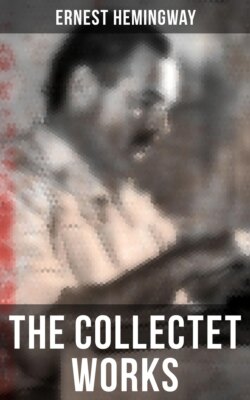Читать книгу The Collectet Works - Ernest Hemingway - Страница 25
На сайте Литреса книга снята с продажи.
CHAPTER SIXTEEN
ОглавлениеTable of Contents
Night in Petoskey. Long past midnight. Inside the beanery a light burning. The town asleep under the Northern moon. To the North the tracks of the G. R. & I. Railroad running far into the North. Cold tracks, stretching North toward Mackinaw City and St. Ignace. Cold tracks to be walking on at this time of night.
North of the frozen little Northern town a couple walking side by side on the tracks. It is Yogi Johnson walking with the squaw. As they walk Yogi Johnson silently strips off his garments. One by one he strips off his garments, and casts them beside the track. In the end he is clad only in a worn pair of pump-maker shoes. Yogi Johnson, naked in the moonlight, walking North beside the squaw. The squaw striding along beside him. She carries the papoose on her back in his bark cradle. Yogi attempts to take the papoose from her. He would carry the papoose. The husky dog whines and licks at Yogi Johnson’s ankles. No, the squaw would carry the papoose herself. On they stride. Into the North. Into the Northern night.
Behind them come two figures. Sharply etched in the moonlight. It is the two Indians. The two woods Indians. They stoop and gather up the garments Yogi Johnson has cast away. Occasionally, they grunt to one another. Striding softly along in the moonlight. Their keen eyes not missing a single cast-off garment. When the last garment has been cast off they look and see far ahead of them the two figures in the moonlight. The two Indians straighten up. They examine the garments.
“White chief snappy dresser,” the tall Indian remarks, holding up an initialled shirt.
“White chief going get pretty cold,” small Indian remarks. He hands a vest to the tall Indian. The tall Indian rolls all the clothing, all the cast-off garments, into a bundle, and they start back along the tracks to the town.
“Better keep clothes for white chief or sellem Salvation Army?” asks the short Indian.
“Better sellem Salvation Army,” the tall Indian grunts. “White chief maybe never come back.”
“White chief come back all right,” grunted the little Indian.
“Better sellem Salvation Army, anyway,” grunts the tall Indian. “White chief need new clothes, anyhow, when spring comes.”
As they walked down the tracks toward town, the air seemed to soften. The Indians walk uneasily now. Through the tamaracks and cedars beside the railway tracks a warm wind is blowing. The snow-drifts are melting now beside the tracks. Something stirs inside the two Indians. Some urge. Some strange pagan disturbance. The warm wind is blowing. The tall Indian stops, moistens his finger and holds it up in the air. The little Indian watches. “Chinook?” he asks.
“Heap chinook,” the tall Indian says. They hurry on toward town. The moon is blurred now by clouds carried by the warm chinook wind that is blowing.
“Want to get in town before rush,” the tall Indian grunts.
“Red brothers want be well up in line,” the little Indian grunts anxiously.
“Nobody work in factory now,” the tall Indian grunted.
“Better hurry.”
The warm wind blows. Inside the Indians strange longings were stirring. They knew what they wanted. Spring at last was coming to the frozen little Northern town. The two Indians hurried along the track.
The End
